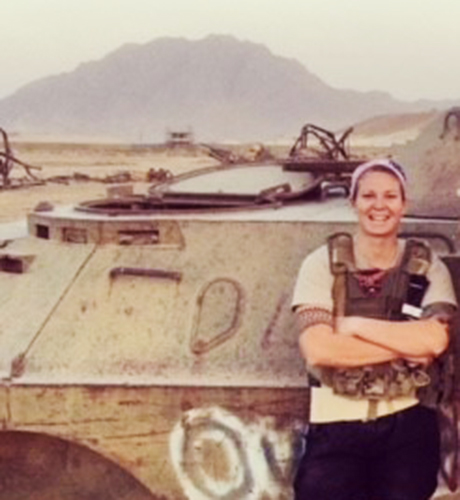Feature
Blazing a Trail: Toni Moran Creates New Paths in the Army and the Law
Monday, July 10, 2023
Associate Antonia (Toni) Moran first joined the US Army to continue a familial legacy as both her father and grandfather served, with the latter having fought in World War II. While she may have followed in the footsteps of her family toward the Army, Toni soon blazed her own trail. Selected for a very elite all-female unit, Toni was deployed to Afghanistan in support of Operation Enduring Freedom. She served as an enabler supporting the Joint Special Operations Command Forces and instructed Afghan Security Force members on sensitive combat operations.
Toni continues that trailblazing spirit at Morgan Lewis, with a pair of pro bono cases she worked on that prompted the US Department of State to change its policy related to the children of same-sex parents that were born abroad. Toni currently serves as an associate representative of Morgan Lewis’s Veteran Lawyer Network. She is on the board of the Philadelphia Diversity Law Group Alumni Association and is an active member of the firm’s LGBTQ+ Lawyer Network.
What was your primary role in the Army?
Early in my military career, I had the opportunity to try out for a new and elite all-female unit in the Special Operations Community called the Cultural Support Team. There was a rigorous selection and training process over several months before I and five other women were selected for a deployment to Afghanistan with the 75th Ranger Regiment. Operating predominantly at night, our role was to accompany all-male units to search and tactically question women and children during high-stress operations.
We also had the honor of training Afghan female soldiers. These missions were incredibly high-stakes, and many were briefed at the highest levels of the military. I loved my time in the Army and have stayed very close to those I deployed with. In fact, some of the Afghan female soldiers I trained have since sought refuge in the United States and I have been able to visit several of them in recent years to reconnect.
What led to your career switch to law?
After an injury that required several surgeries, I was given the opportunity to medically leave the service. While I was incredibly disappointed to be leaving the Army, I was fortunate to have the opportunity to go back to school using GI Bill benefits.
Now, I’m able to apply my experiences and training in the Army in a new setting. While in very different contexts, the skills of being able to problem solve in high-stress situations, gain input and trust from various stakeholders, and work cooperatively with diverse groups of people were crucial during my military service and are equally important in my legal career.
How do you support veteran causes as a lawyer?
I am one of the associate co-leads of Morgan Lewis’s Veteran’s Lawyer Network, which brings together veterans throughout the firm. I also maintain an active pro bono practice, primarily assisting combat veterans seeking discharge upgrades before the Board of Veterans’ Appeals. In those cases, we assist veterans—many of whom showed symptoms of mental health disorders such as depression and post-traumatic stress or suffered from traumatic brain injuries following their combat service—seek upgrades to the characterization of their service, which, if granted, enable them to receive benefits from the VA.
That’s not the only way you give back—what other organizations do you support?
I am also very active in Morgan Lewis’s LGBTQ+ Lawyer Network. As a gay woman, it is very important for me to not only have a sense of community, but also find ways to give back. One of my best experiences at Morgan Lewis was working with several other LGBTQ+ lawyers on a pair of key cases that secured the citizenship for children born abroad to two same-sex couples. Due in part to our efforts, the US Department of State later reversed the discriminatory policy that denied citizenship to some babies born abroad to same-sex parents. That was such an incredibly rewarding experience and one of the highlights of my legal career.
Any advice to allies on ways to help veteran or LGBTQ+ causes?
Get involved! Whether through pro bono work, participating in community organizations, volunteering, or simply getting out and voting, those wanting to support others—especially marginalized groups—can make a difference simply by doing something.
